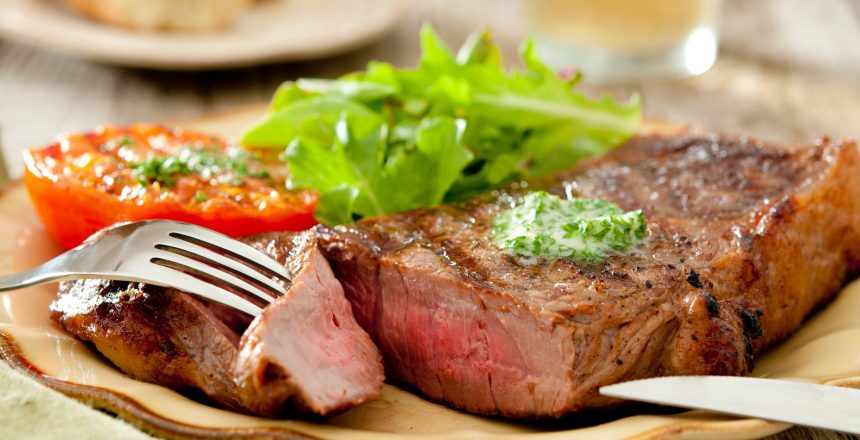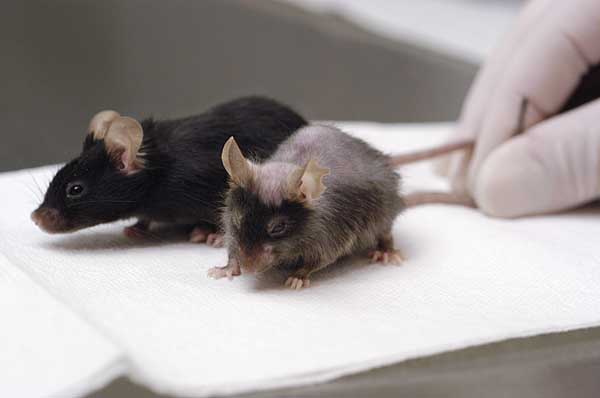There are many ways to lose weight (fat), but some entail much more difficulty than others (bariatric surgery), while others may be dangerous to health (diet pills). The greatest hurdle to losing weight, however, is hunger. If your hunger can be kept under control, then you can lose weight. Let’s see how to lose weight without hunger.
Low-carbohydrate vs low-fat, low-calorie diets
A viewer of my anti-aging course asked me about a study doing a side-by-side comparison of a low-carbohydrate vs a low-fat, calorie-restricted diet. (ref.)
He pointed out that both diets resulted in about the same weight loss, which was 11 kg (~24 lbs.) at 1 year, and 7 kg (~15 lbs.) at 2 years.
Both diets were equally effective for weight loss in this study, so why should you do one over the other?
The answer to that question can be found in looking at the study’s details.
The low-carb group was restricted to 20 grams of carbohydrates daily, consisting only of low-glycemic vegetables. Their intake of fat and protein was unrestricted – they could eat as much of those as they wanted.
“After 3 months, participants in the low-carbohydrate diet group increased their carbohydrate intake (5 g/d per wk) until a stable and desired weight was achieved.”
That’s weird right there; does “a stable and desired weight” mean they had lost too much weight? That seems doubtful, as the participants started at an average BMI of 36, which is very obese. Also the whole point of a low-carb diet is to restrict carbs; by the end of the study, the low-carb diet may not have been very low-carb, although the study doesn’t report this.
The low-fat group ate a diet of less than 30% fat, and their calorie intake was restricted to between 1200 and 1500 calories a day for women, and 1500 to 1800 calories a day for men.
I don’t know about you, but if I had to restrict my food intake to between 1500 and 1800 calories daily, I would be hungry.
Hungry, or not
In the famous Minnesota Starvation Experiment, the subjects ate about 1600 calories daily, and they were so hungry they dreamed of food and thought about it constantly. The subjects were of normal weight to start, so perhaps an obese person wouldn’t get quite so hungry. But still.
Here’s your choice between the two weight-loss diets:
- Eat as much as you want but no carbohydrates.
- Eat low-fat food and be hungry a lot.
Pretty simple, IMO. Stop eating bread, pasta, tortillas, rice, potatoes, etc., and if you have too much body fat, you’ll lose some or most of it.
Or you can measure all your food so you can stay within calorie limits, plus exercise a lot of willpower to keep from eating when you’re hungry.
Biomarkers
In this study, those who ate the low-carb diet, unrestricted in calories, had greater reductions in blood pressure and triglycerides, and greater increases in HDL cholesterol.
Since the triglyceride/HDL ratio is the most important blood lipid marker, and the lower the better, the low-carb group improved their cardiovascular risk more than the low-fat group.
CICO
CICO stands for “calories in, calories out”, and refers to the idea that all weight loss occurs because calorie expenditure is greater than calorie intake.
At face value, I think it’s correct.
But it’s not a very useful piece of information. It’s like saying that all ships sink because they take on water, which does you little good in preventing your ship from sinking when out on the water.
You need to discover why your ship is taking on water.
Hormones and other molecules in your body regulate hunger. When hunger is deranged for some reason, you eat more.
If you can control hunger, you can control calorie intake without counting calories.
A low-carbohydrate diet controls hunger. “Spontaneous reduction of calories” is commonly reported on low-carb diets. (Ref.)
Many people state that low-carb diets work only because they result in fewer calories eaten. That there’s no “magic” about them.
And? That’s a good thing, and reduction of hunger is probably the main way that low-carb diets cause weight loss.
If you can lose weight (fat) without being hungry, why wouldn’t you?
Lifestyle, not diet
Another commonly heard objection to low-carb diets is that when you start eating carbs again, you gain the weight back. Therefore, supposedly, low-carb diets don’t work.
That’s right: eating what made you fat in the first place makes you fat again.
As a wag on Twitter recently put it, I can rescue you from drowning, but if you go back in the water you’ll drown again.
Weight loss without hunger
You can lose weight with either a low-fat, calorie-restricted diet.
Or you can eat as much as you want on a carbohydrate-restricted diet, with little to no hunger.














29 Comments
I would have written this post by saying to run protein numbers are high as possible to avoid hunger. That is, lean chicken breast and white fish or any food that is 80%+ protein by calories. My n=1 is fat cravings are easier to manage than carb cravings. Thus, I prefer low fat to create a caloric deficit.
I am definitely coming round to this way of thinking JRM. I have been trying to do an 18-19 hour fast each day (from 7pm to 1-2pm the next day). I do ‘cheat’ a bit though by having the occasional teaspoon of coconut oil throughout the morning which seems to ward off hunger (although apparently this will not affect autophagy..). It works even better on those few mornings where I take it with coffee. But, I have recently been trying to up my protein markedly during my 2 meals to balance out the protein fast in the morning. I find that by having a very high protein dinner, it helps me ease through the fast the next day.
And picking up on Sam’s very useful comment below – I also am a fan of whey protein, and drink 30g of it with my dinner to boost my protein without feeling completely stuffed. I know that some people in the health space advise against taking whey protein too often due mainly to the fact that it is so fast acting, and they believe it may damage the integrity of the gut if taken on its own too often. However, I believe that taken in the context of a full meal, this will naturally ‘slow down’ it’s effects, and I believe once per day is not excessive. Similarly it is clearly of benefit when taken around a resistance training workout. Great to know that it is an NR precusor too though – I had no idea..
Does anyone else have a view on a high protein approach for maximising satiety?
I have been cutting at 1700 calories daily and I am not hungry in the least. If you would be hungry after a 1700 calorie diet, maybe you should consider Googling “voluminous eating.” If you want to eat foods high in calories….then yeah, you’re going to have satiety issues. Heck, my lunch is only 200 calories, but has enough food to fill me to the top! (Spinach 57g, 1/2 slicing tomato, 1/2 cucumber, 0.4C red onion, 2T real bacon bits, 6 jumbo black olives, and 4T Walden Farms 0cal 1000 island dressing). Things to avoid: full fat cheese, sauces, full fat milk, all condiments, etc. These ingredients are empty calories, meaning they fill you with calories and not satiety. People want to eat trash mostly and they get what they pay for…….and it shows.
Things to avoid: full fat cheese, sauces, full fat milk,
Why avoid cheese and whole milk provided you are not lactose-intolerant?
The complex fats in both are healthy.
Because they are high in calories, it isn’t difficult to get your healthy fats from more voluminous foods that are lower in calories. Once you reach a healthy weight and can follow a maintenance level calorie intake, then it won’t be as difficult to incorporate the higher calorie foods.
I agree that full-fat dairy is probably very healthy for those who do not have an intolerance: for example full-fat plain yogurt contains plenty of protein, Vitamin K, Vitamin D3, Calcium, probiotics in their natural form, CLA etc.. However… Some people are concerned that the ‘casein’ portion of the milk protein is highly inflammatory. Indeed, on his most recent short podcast on histamine-containing foods, Chris Masterjohn says he has been trying to remove dairy from his diet since it reliably adds 2 lbs to his weight every time he adds in full-fat dairy – which he believes is due to inflammation. Dave Asprey and Dr Mercola also follow the same approach. Dominic D’Agostino has mentioned that going heavy on the dairy spiked his LDL, so he has cut way back on it these days. So it really does seem to be ½ of one and 50% of the other, so what to do? On looking into the casein issue further I realised that there are 2 forms of casein ‘A1’ and ‘A2’. It is the A1 caseins that appear to be the inflammatory ones (eg from Holstein breed cows). I have therefore switched to consuming only full-fat goats or sheep’s yogurt and cheese (which are always A2). They are both delicious by the way, and about the same as what I was paying for my previous full-fat Greek yogurt. You can also buy ‘A2’ milk here in the UK (or ‘Jersey’ milk which is mostly A2), but I tend to drink more of the sugar-free almond milk in my tea than cow’s milk…
Anyone else got any views on casein and whether we should be avoiding it?
Full-fat cheese and other dairy products are actually quite healthy – your description of them as “trash” is not supported by the science. Here is one recent article:
https://www.theatlantic.com/health/archive/2018/07/cheese-butter-not-necessarily-linked-to-death/565253/
Also, I would not consider your Walden Farms zero-cal dressing to be healthy at all. Here is the list of ingredients:
Triple Filtered purified water, white vinegar, cellulose gel, salt, natural flavors, onion owder, garlic powder, sour cream flavoring (non dairy), lemon juice, white pepper, xanthan gum, lactic acid, parsley, cayenne pepper, food color and sucralose. Contains trace calories.
Do you really think things like cellulose gel, non-dairy sour cream flavoring, xantham gun, and sucralose are good for you? The sour cream flavoring and sucralose are man-made pseudo-foods, and cellulose gel is certainly not something humans are designed to consume. Here are some of the potential problems with sucralose:
Sucralose may increase blood glucose and insulin levels: Sucralose may negatively affect the very people who are using it to decrease sugar consumption and stabilize blood glucose levels. A study found that sucralose increased blood glucose levels and insulin levels while decreasing insulin sensitivity. This could negatively affect people, especially those with diabetes, who consume sucralose to try to manage their blood glucose levels.
Sucralose and gut health: Gastrointestinal health, gut health, has become a topic of great interest. It’s no surprise that our bodies and gastrointestinal (GI) tract are home to more bacteria than we have cells in our body. We tend to think of bacteria as something to avoid but bacteria also play a beneficial role in our health. A large portion of our immune system is located in the GI tract and beneficial bacteria play a major role in a healthy immune system. A study on sucralose and the GI microbiome found that sucralose altered the gut microbiome by decreasing beneficial bacteria by up to 50%. Additionally, they found that 12 weeks after the study the beneficial bacteria in the GI tract had not recovered. Which means that even after sucralose was no longer being consumed the GI tract was still negatively affected. The study also found that sucralose may limit the bioavailability of certain orally administered medications which may make medications less effective.
I’m glad you are not hungry on your low-fat diet, but if I were you I would drop the Walden dressing. Also, you are way low on protein and healthy fats. You might lose some weight over time on your diet, but your health is probably going to suffer if you stick with it over a long period of time.
Although we disagree on the degree of severity from having a negligible amount of Walden Farms dressing (or its ingredients), that isn’t my point. I was commenting on your statement that you would be hungry at 1700 calories, which I assume shows that you are eating too many high calorie foods. Things like dairy can be nearly eliminated to make way for more voluminous foods that cause a higher degree of satiety. Milk and cheese don’t even have fiber, so why not at least switch them out for a healthy nut alternative? Not only do they provide healthy fats but you would be full longer than using milk or cheese as an ingredient or by itself. You simply do not have to have dairy as long as you eat a healthy diet, macro balanced. As far as my protein consumption, I am clueless as to why you assume I am deficient. My protein consumption yesterday was actually “too” high according to the most recent studies: 180.6g for a 36yo male of 145lb. I track every calorie as well as every macronutrient in my diet. Furthermore, my maintenance calorie demand (AMR minus exercise) is 1703. Therefore, a person of similar age, weight, height, and activity level, whom has satiety issues at 1700kcal/daily, might want to evaluate their eating habits and dietary choices.
please don’t assume what others do based on your own experiences. you lose credibility fast that way. instead of telling others they are doing it wrong just ask what they are doing. ok? thanks
With all due respect, the fact is: calorie deficit = weightloss for everyone on this planet.
Do bear in mind though – it’s calories absorbed, not calories consumed that matter. There are many ways to influence that. Gary Taubes has much more on that…
The only protein you mentioned when you listed foods you consumed was 2T of bacon bits. You did not mention consuming any other protein foods. As for full-fat dairy, did you read the Atlantic article? Here is a link to a peer-reviewed study that was cited in the article:
https://www.ncbi.nlm.nih.gov/pubmed/24723079
Nuts are good, but there is certainly nothing wrong with consuming whole-fat dairy products, as long as you can tolerate dairy. Nothing wrong with consuming saturated fats from meat, either.
As long as you are consuming nutrient-dense, whole foods, there is no need to closely track calories, in my opinion. The real “trash” foods that you want to avoid are pseudo-foods that come in a box or bottle (like your Walden dressing) with a long list of ingredients on the side, some of which are man-made junk.
Most interest in fasting. Need help
Google. Bing. Don’t eat. There, that wasn’t so hard, was it?
Hi I’ve been reading your site for a long, long time. Since before when it was more politics at mangans.blogspot.com. Not as much recently. I wanted to comment about NAD+. A precursor is Nicotinamide Riboside that a lot of people are taking. It seems to stop a lot of the symptoms that you used to have with fatigue. You talked a lot in the past about Whey being one the things that brought you out of chronic fatigue. I happened to notice that whey is one of the natural food sources for raising NAD+. I just thought I would bring it too your attention. Here’s a link where they talk about food sources to raise Nicotinamide Riboside and in turn raise NAD+. I haven’t tried NAD+ but I’m going to very shortly. I’m feeling very tired these days.
https://www.nootropedia.com/nicotinamide-riboside/
You’re looking good.
[Yes I know you probably know all about NAD+ already but I’m not sure if you knew that whey was a way to boost nicotinamide-riboside. So no I’m not talking down to you in any way. I realize how far ahead of me you are on most all of these things.]
🙂
I do think that we’re beginning to see benefits to all this research on aging. A lot of us did just fine on a not so perfect diet but as we’ve gotten older we just can not repair ourselves like we used to. The reviews on NAD+ on Amazon are really good. A minor few it doesn’t do much for but it may be they already make enough so it doesn’t benefit them so much.
There’s another a chemical compound called NMN, a NAD+ precursor that seems to rejuvenate blood vessels. Wow.
https://www.nextbigfuture.com/2018/09/rejuvenating-blood-vessels-and-vitality-for-an-antiaging-effect.html
https://www. goodtoknow.co.uk/food/1500-calories-a-day-6122
Dallas, I’ve read all your comments about volume vs. calories and your phobic approach to eating. When I want to lose weight, yes, I too record all that I eat; it keeps me honest. But you are so wrong about volume creating satiety.
A big bowl of broth will create the illusion of satiety, but in 30 minutes or an hour, your body knows that it’s been fooled and wants some real food. Protein, fats, carbs.
I don’t think you mentioned height, weight, or build. 1700 kcals/day isn’t even the USDA hypothetical 135 pound woman requiring 2000. I’m over 6 feet (and shrinking with age) and my maintenance is at least 2500 kcal/day. I’ve observed if I have a very low calorie day, 1200-1600, the next day I am starved.
AS someone up there inferred, to each his own. You happy with what you do? Great. But don’t preach to the rest of us; generally, we ain’t dummies.
Mr. Mangan,
I couldn’t find an email address for you on the site, so I am going to post this here and you can delete it if you want.
I came across an extremely interesting article on the cause of autoimmune diseases and I think it is something you would be interested in. The author (an engineer) came down with eczema in his 50s and it spurred him to research possible causes. What he came up with is a pretty powerful case and it certainly fits right in with my personal experience. You can read his story on his blog. It is worth looking over, I promise you.
Interestingly, the diet he came up with to combat the condition is basically mostly just beef.
The article he wrote on his blog is at https://ggenereux.blog/2015/02/12/eca/
He has also written updates since he first wrote the post in 2015.
I am posting this for you because I think it’s important that this concept get around so people can get a chance to try it out and try to knock it down. It rings true for me.
That’s super interesting. Look at this post
https://pdmangan.com/why-do-old-flies-die/
and see how this syncs up with exactly what he said. I wonder if there’s some way you can dump “A” like you can iron???
Another interesting correlation is the drug Accutane. It was a derivative of Vitamin A. Quote from wikipedia,”…Roche decided to remove Accutane from the US market after juries had awarded millions of dollars in damages to former Accutane users over inflammatory bowel disease…”
Interesting…[I made the accutane comment before I had read the whole article. He noticed the same thing I did.]
Mark this paper you linked is remarkable. Maybe he’s right or maybe not, the facts he states are astounding.
Now here’s what’s super interesting about this paper. He has linked over use of Vitamin A with all these diseases. He makes a fairly good case for it. One of the really big clues is,
“…Decreasing incidence of inflammatory bowel disease in Eastern Canada: a population database study.
The key observations here are:
A remarkable ~35% drop in Crohn’s disease over this time period (1996-2009)
A stunning ~50% drop in Alzheimer’s mortality over this time period ( 2000-2011)…”
These numbers are massive, massive changes and SOMETHING must be responsible. He linked it to the collapse of the Eastern Canadian fisheries and the removal of these very high vitamin A level fish from the diet. He gives many other large population studies that show similar disease trends related to excess vitamin A intake. The contrast in rates of these auto-immune type diseases between Finland, lots of fish, and Russia is astounding.
What popped out in my mind as another influence is a question I have asked over and over. It’s seems such a mystery to me why some people seem to do very well on a vegetarian diet and some don’t. Maybe this is the answer. If a first world wealthy person goes on a vegetarian diet they could have problems due to a eating a large amount of salads and vegetables with high vitamin A, [vegetables and fruits with bright colors]. A person in a less developed area would be more likely to eat a vegetarian diet with much less vitamin A. Maybe more starches as a mainstay of of their diet. This would explain the good health results from the two widely different diets. More meat might mean less vitamin A corresponding to good health with a no carb diet. Could it not be the carbs but the extra vitamin A fortified foods in the diet?
Could this also account for the large increase in autism among the “smart set” in silicon valley’s kids??? It’s attributed to all kinds of things, genetics, vaccines, etc. but it could it be that they are feeding their children “properly’ with lots of green leafy vegetables, bright fruits with massive vitamin A and combined with total fortification of just about everything with even more vitamin A???
Thanks so much for posting that link, I spent the last few days pouring through his ebooks. Absolutely stunning stuff, the most well-argued hypothesis yet as to why those with autoimmune disorders have been finding relief on the carnivore diet. Cheers!
i tell you what i wont do, listen to people on the internet tell me to do what they do cause it DOESNT WORK THAT WAY. everyone is different. find your thing. there is no way i would be satisfied with a 200 calorie salad. that’s cool you are, but I’ve tried it. doesn’t work for me
The 200 calorie salad was only an illustration of how much food can be involved for only 200 calories. Being “satisfied” is different that being full. Some people are only satisfied after eating a desert, but that isn’t going to aid in weightloss.
I think you should consider selling a Rogue Health Cookbook. There are a lot of young people in the US who don’t have the slightest clue how to cook healthy meals (or how to cook at all).
Good idea, Matt. I’m working on a diet plan and I’ll include a few recipes.
mabye work on a mental toughness plan instead.
You could work on one about how to get a clue.
What’s there to know other than to cook meat (which is easy)? That’s all I cook, it’s only by exception that I cook other things like a low-carb baked chocolate cheesecake.
DO you seriously need a huger free cut cycle?
to lose weight all you need to do is not eat despite the fact you are hungry.
People simply lack the mental toughness necessary to be in caloric deficit.
This is pathetic, if you are serious about your fitness you should be able to deal with hunger and stop succumbing to ghrelin.